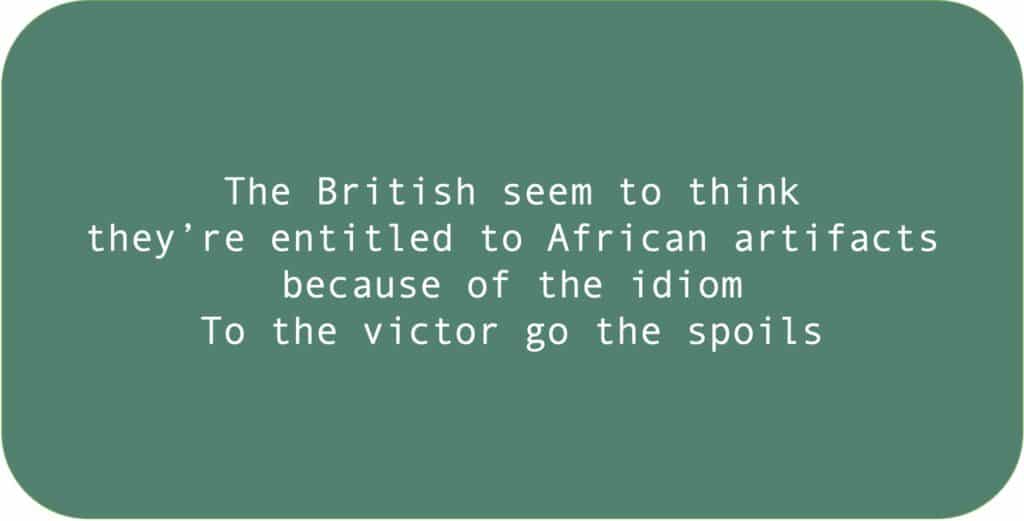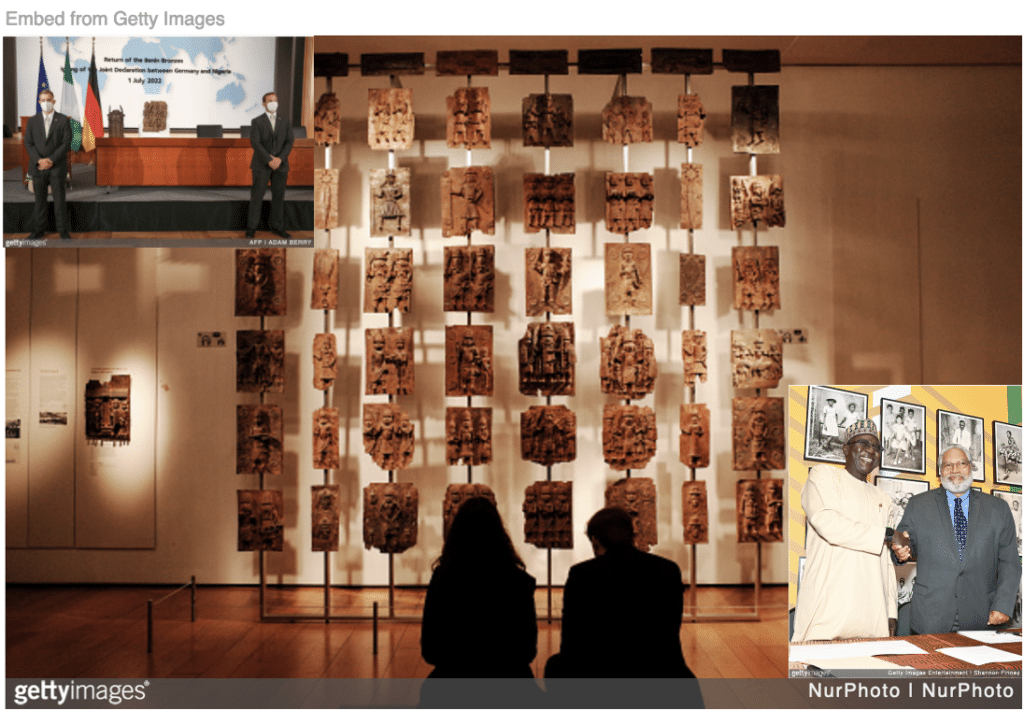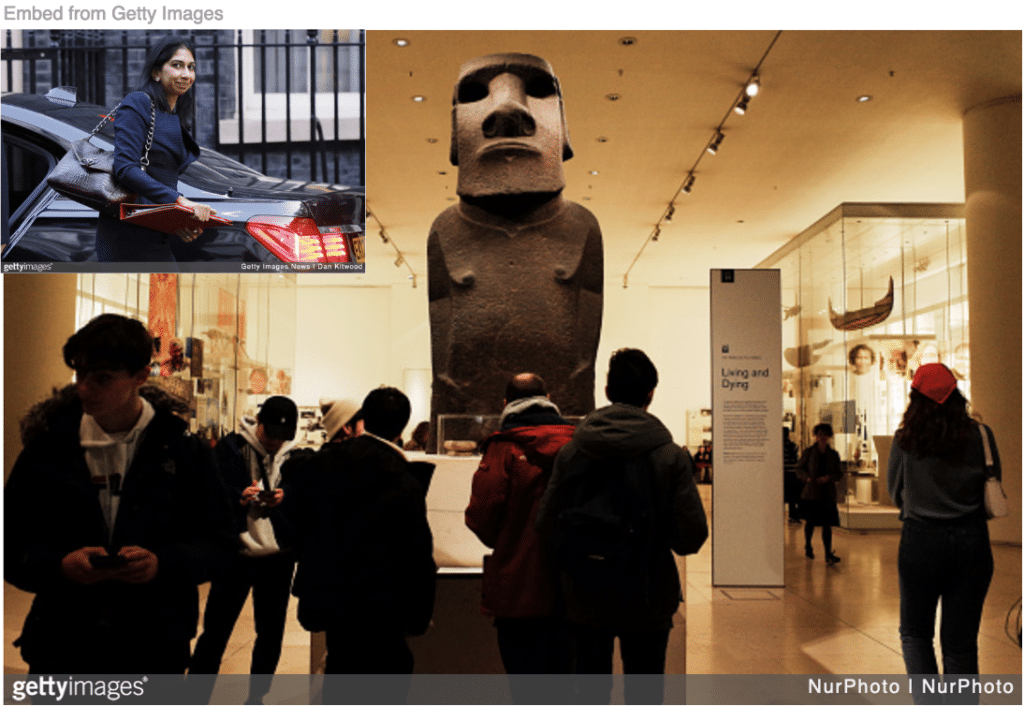
Give our Benin Bronzes back
The Smithsonian marked Indigenous People’s Day last week by holding a ceremony to give 29 Benin Bronzes back to their rightful owners. It wanted the ceremony to be symbolic and substantive in equal measure.
The Smithsonian is the latest institution heeding Nigeria’s demand to return artifacts British forces plundered. Most notably, Germany agreed last July to give back over 1,100 Benin Bronzes now on exhibit in museums across the country. But Aberdeen University in Scotland was the first to give back a “priceless” bronze of an oba (king) of Benin a year ago this week.

The British Museum remains a conspicuous and ironic holdout. After all, the British are the original plunderers of most of these artifacts. Yet, Britain is the country most hell-bent on keeping its ill-gotten loot.
British Empire was just a cover for colonial violence and plunder
The bronzes were stolen in 1897, when British forces sacked the Benin Kingdom, in modern-day Nigeria. The royal palace was burned and looted and the oba (ruler) exiled. The British confiscated all royal treasures, giving some to individual officers and taking most to auction in London. An estimated 3,000 objects eventually made their way into museums and private collections around the world.
(The Guardian, October 11, 2022)
Books such as Legacy Of Violence: A History Of The British Empire highlight that plundering was more a feature than an aberration of British colonialism. But the plundering they perpetrated paled in comparison with the violence they executed.
Survivors of the infamous massacre British forces executed against the villagers of al-Bassa in Palestine in 1938 would attest to this. Survivors of the sexual violence they perpetrated against Kikuyu men and women in Kenya in the 1950s would do the same.
Using dark faces to whitewash British history
Home Secretary Suella Braverman is on a one-woman crusade to whitewash Britain’s history of looting, pillaging, and raping.
Braverman, who has a Goan-origin father who came to Britain from Kenya and a Tamil mother who’s from Mauritius, hasn’t got a bad word to say about the British Empire. ‘I am proud of the British Empire,’ Braverman declared last week in an interview with the right-wing UK publication The Spectator.
‘It was the British Empire that brought infrastructure, the legal system, the civil service, the military to countries like Mauritius and Kenya,’ she said, adding that her parents came to ‘this country (Britain) with a huge fondness for the British Empire.’
(The Telegraph, October 13, 2022)

The Conservative Party often uses non-White MPs to front draconian and arguably racist immigration policies. So it’s no coincidence that Braverman is parroting the party line her predecessor Priti Patel – of Indian descent – notoriously championed.
The law is making us keep them
The British insist they’re entitled to these artifacts as the spoils of war. The British Museum cites the law against “deaccession.” It claims that law prevents it from doing the right thing.
In other words, the British plundered and then enacted a law that says they cannot return the items they plundered. That’s their story, and they are sticking to it.
Head of the Smithsonian is Black. Head of the British Museum is White
It was symbolic enough that the ceremony to give back the Benin Bronzes happened on Indigenous People’s Day. But I suspect what many people found most symbolic was that the head of the Smithsonian is Black. Black leadership matters.
Having a Black person in that position helped the Smithsonian to do the right thing. After all, its head, Lonnie Bunch, is quoted saying this was a no-brainer because “we are not the owners.”
On the other hand, it might be that having a paternalistic, neo-colonial White man as head of the British Museum is why it’s refusing to do the right thing.
But I hasten to clarify that not all Whites who head museums are complicit. After all, Whites head institutions in Scotland and Germany that did the right thing before Bunch did. But there’s no denying the symbolism of the Black head of the Smithsonian standing so prominently among those to redress this historical wrong.
Repatriation vs Reparations
For decades, Nigerians have demanded the return of their Benin Bronzes. They are reportedly dealing with over 160 institutions across several continents to return over 3000 figurines, tusks, and sculptures of Benin’s rulers.
But this demand for repatriation of plundered artifacts should not be conflated with the standing demand for reparations for colonial crimes and slavery. Ghana has been in the vanguard of countries demanding the latter.
The British used to quip paternalistically about the “white man’s burdens.” But, whatever those burdens, they paled compared to the crimes against humanity the white man left in his colonial wake. Reparations aim to make him pay for those crimes.
As it happens, DR Congo had to disabuse Belgium of conflating repatriation with reparations just months ago. Belgium wanted plaudits for repatriating Patrice Lumumba’s tooth. He, of course, was the first prime minister of the DR Congo.
But the DR Congo duly pointed out that this was only a goodwill gesture. And that this had nothing to do with its standing demand for $40-50bn in reparations from Belgium for the “painful episodes” of the colonial era with its “acts of violence and cruelty.”
That said, the Greeks sculpted the Elgin Marbles. The Africans sculpted the Benin Bronzes. But, even to the untrained eye, it’s easy to see why the Greeks had nothing on the Africans. Don’t you agree?